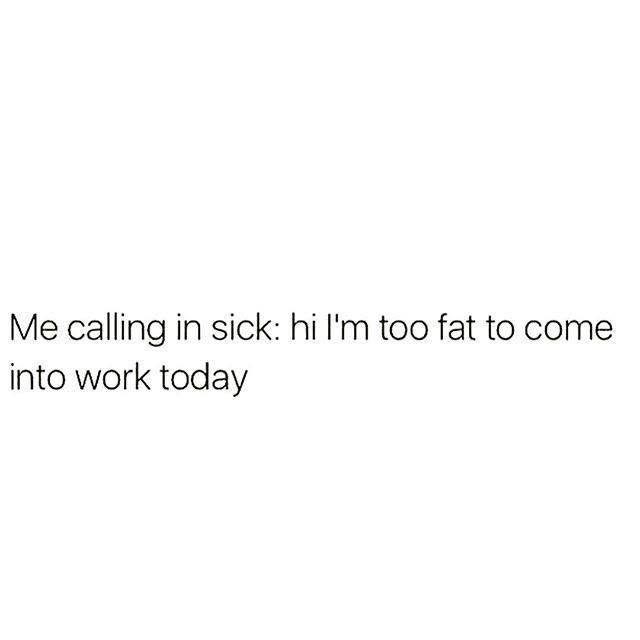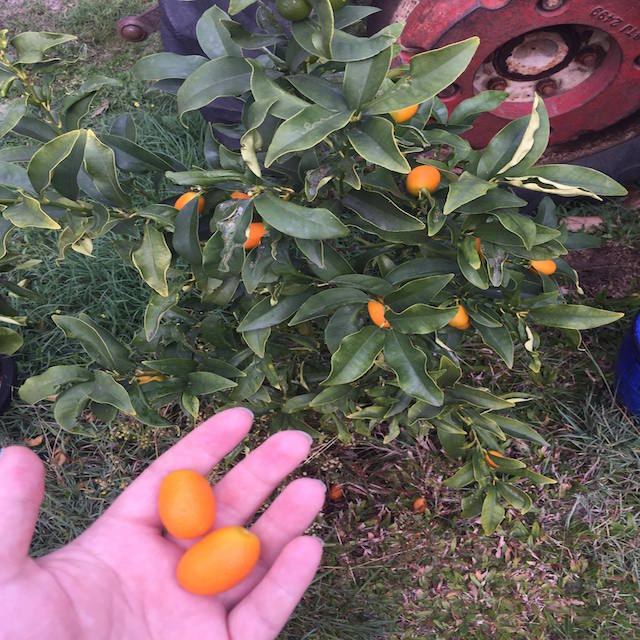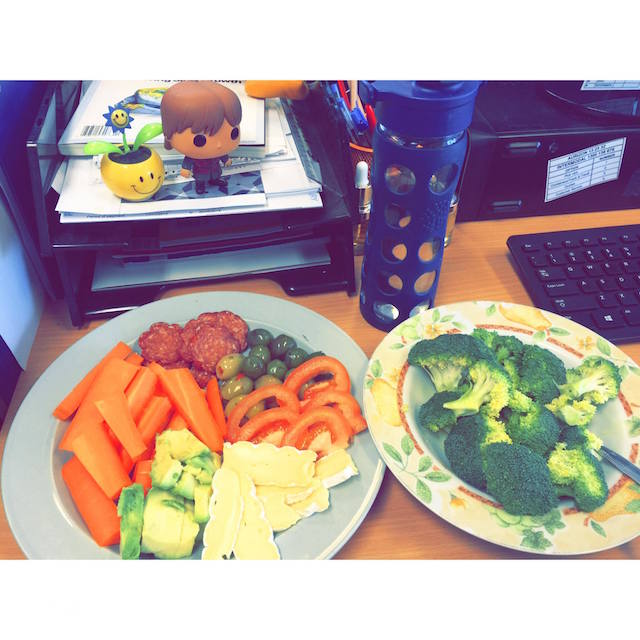
As with any new venture on its first day, today was a good day.

Skipping around the garden like a cumquat-picking fool.
Sort of.
I woke late after working long into the night, and dressed for work relaxed and certain. After my uber deposited me outside the city Woolworths, I marched in with my head held high and some super inspirational music blasting through my headphones.
I was going to buy the Healthy Food.
My pinkish gold watch flickered in the dappled sunlight of a day on the verge of rain, and I felt almost like a well put-together individual as my heels clicked softly across the polished floors of the supermarket from the escalators.
I patted myself on the back with every purchase: “an avocado—good fats, Erin! Look at that forest green skin, mmm. How could anyone pass that up?!”
“Grapes—nature’s candy.”
“End of the produce aisle? Well, I’ll just be turning around then. Who do you think I am—one of your brainwashed drones?!”
At the time, the pride felt earned. It wasn’t until a little later in the day—say, about 10 minutes from that moment—that I learned how very young I was on this journey.
I almost walked past the coffee vendor, but decided that I could do with the caffeine. My ego kicked in and I even considered getting a green tea (!), but with no one else around to impress with it, the idea was quickly discarded. As I enquired as to whether the vendor accepted card for small purchases like single coffees and the cashier explained that they didn’t, my eyes wandered immediately to the cakes and tarts in the glass window.
I was so close.
I practically threw my purse back in my bag and ran out of the shopping centre. For anyone who saw me: no, I was not being chased and yes, that was my cardio for the week.
The whole walk to my “office” I chastised myself.
“’Grapes are natures candy’—yeah, well, you definitely need more of that! You couldn’t even last a morning! It’s been less than 24 hours, and for at least 70% of that you were unconscious. After 26 years, you can’t even muster the will power to be awake for, like, three hours and not eat cr*p. You’re pathetic. No wonder things have turned out the way they have. Have you cleaned your car since you got back home, tubs? Of course not, everything’s just too much effort for the little baby, isn’t it? You make me sick. Look in the mirror. Actually, you really don’t need to bother, just look at your life! Your apartment is a shambles, your career is struggling, you haven’t had a boyfriend in years, when you did have one you managed to f*ck that up pretty consistently, you haven’t called your mother…”
It’s about a 10 minute walk to where I needed to be, and that inner monologue didn’t even stop to take a breath—one of the benefits of being an etheric entity, I guess.
Does any of this sound familiar?
It was as if my mind was split in two and while one half ran rampant with criticism without missing a beat, the other half stood back to observe and absorb. As such, I got a sort of front row seat to the process that is self-hatred, and the ways in which our social programming has dictated our self-worth.
See, the fact that I almost glowed green and used the nice cashier man to smash the glass display cabinets and literally inhale the delicate little treats therein, was a normal, if not expected, reaction to visual stimuli activating a primal brain. I know this, logically.
Evolutionarily, we are already programmed to seek out sugar. There’s a reason fruit—or, as I like to think of them, tiny sugar presents—are so attractive. They want to be eaten; they’re begging for it. They’ve designed themselves over millennia to present in the most inviting and signalling way possible for their intended audience, which includes us.
On top of that, we’ve socially conditioned ourselves to sniff out the pot of sweet white powder at the end of every metaphorical rainbow. Sugar is attached to everything—milestone events, emotional turbulence, convenience, even healthy lifestyles. Look at the way “energy” or “fuel” is marketed to children—does any parent truly believe that those chocolate brown puffs of wheat slowly turning the milk in the bowl into a weird caramel colour are actually good for their kids?
As a third and final psychological boot to the face, we’ve backed all of this up with excessive intakes of the stuff. Sugar is like any drug—once addiction has truly set in a certain level of substance needs to be maintained just to keep a steady handle on the world, and to experience the highs the drug promises, time and time again, we always need a little more than we had before.
All of this despite the fact that of any socially accepted substance, sugar is arguably the most damaging. And yes, it is the thing making us fat—almost the only thing.
So, when a big neon sign that said “Feel Good Happy Yum Yum Things! Eat Them or You’ll Die!” flashed in front of my very old, very wise, but not very street savvy brain (bless its cotton socks, it tries), it triggered a cascade of reactions that were completely out of my hands. And before I knew it my mouth was literally watering for these things that, when I had the distance to consider it, I didn’t even really want.
But getting the space and awareness to realise this chain of events and our lack of control over it is only really half the battle. Because in the mean time, we’re practically beating the daylights out of our self-esteem. Remember last episode when we talked about Fetch Self and its inability to distinguish between us saying things we mean and saying things out of anger or frustration or hurt?
Well, let’s just say that by 9am my Fetch was drowning in its own tears in the corner somewhere, begging for the nasty lady to stop.
Despite my knowledge, I was readily and somewhat gleefully rolling out emotional punches. At this point, all the positivity night classes and the inspirational memes and the chakra-balancing mountain retreats in world can’t help us, because even though none of the things we say to ourselves are fair—they’re almost always true.
We can’t pluck things out of the air. Insults don’t do their job if they don’t contain a grain of truth. So, arguing with this sociopath who’d been yelling horrible things from her self-righteous soapbox—in an effort to stand up for myself, to be kind—-backfired terribly, because I knew she wasn’t balanced or right or entirely sane, but I knew deep down that she was honest.
How can we, in going through transitions that challenge our conditioning, be kind to ourselves and also be honest?
We need real honesty in order to want to change. The motivation for altering anything about ourselves or our lifestyles has to come from some idea that it’s not perfect the way it is, and that takes some raw truth—sometimes, some truth that makes us feel negatively.
We also need real kindness in order to maintain change. Have you ever had someone in your life who you felt was impossible to please? Did that relationship last all that long, really? When we constantly keep ourselves under the pump—so downtrodden and pressured by measures of success that always seem to shift forward as soon as we reach them—we inevitably “cheat” frequently, or give up entirely, providing further “evidence” for that self-destructive voice to churn over. This cycle of abuse (and that’s what it is; abuse) keeps us stuck.
But if honesty can make us feel bad enough to make a shift, and we need to feel good to keep our new ways, how can we get these two seemingly opposing ideas to intersect?
1.Knowledge is really the first step here:
Arm yourself with as much information as you can fit into your beautiful, amazing, evolved think-sponge. Once you’ve done that, you have the power to separate honest but unfair statements from their honest and balanced counterparts.
Once I knew how I was being tricked—how I had been purposely manipulated by the food industry, the health industry, the fashion industry and a whole world of uncaring media—I found it fairly hard to truly believe the propaganda my self-hatred was spouting.
2. This lead to understanding, and finally to sympathy.
Sympathy seems like a bit of a dirty word these days, but this is exactly what I felt. Here’s this poor, crazy lady having a temper tantrum, who has no idea that she’s been mistreated, misinformed, and left to live life with the shattered pieces of herself. How can you be mad at a person like that, let alone take what they say to heart?
Just knowing the facts and figures will only get us so far, but seeing the intricate and definite ways in which they influence our world allows us to place ourselves, with mindfulness, within that sphere of influence and take true responsibility.
As I became increasingly self-aware, powered by the scientific knowledge I had gained in my research, and the spiritual knowledge I was experiencing, I addressed myself as I would a child.
“You are not a failure. You are human—-you will falter, and stumble, and take the wrong turn. You will do this because you are learning. Not everything is under your control. And while you are learning, you must be patient and gentle and determined. You must remember that fighting is not always violent. And when you forget, I will remind you: that you are clever, and have shown more strength than you ever thought you had, and that you are generous. You have not treated yourself with the respect you have earned, and this is why we are here. Your falters and stumbles and wrong turns do not define you, but they do guide you—-and you have been guided in to dangerous waters. If you will let me, my love, I will show you the way home.”

What I actually ended up eating ~ Taste the rainbow!
** Tune in next week for Episode Three: Pasta, We Need to Talk. **
~
Author: Erin Lawson
Images: Author’s own










Read 0 comments and reply